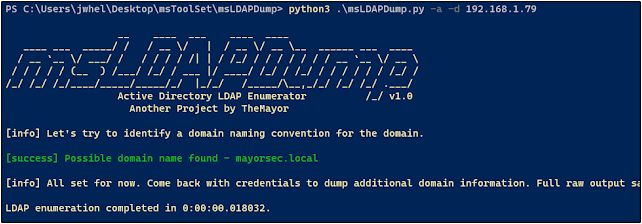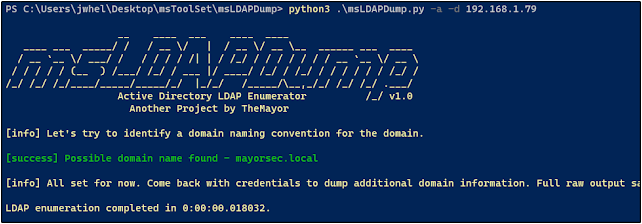msLDAPDump – LDAP Enumeration Tool
msLDAPDump simplifies LDAP enumeration in a domain environment by wrapping the lpap3 library from Python in an easy-to-use interface. Like most of my tools, this one works best on Windows. If using Unix, the tool will not resolve hostnames that are not accessible via eth0 currently.
Binding Anonymously
Users can bind to LDAP anonymously through the tool and dump basic information about LDAP, including domain naming context, domain controller hostnames, and more.
Credentialed Bind
Users can bind to LDAP utilizing valid user account credentials or a valid NTLM hash. Using credentials will obtain the same information as the anonymously binded request, as well as checking for the following:- Subnet scan for systems with ports 389 and 636 open
- Basic Domain Info (Current user permissions, domain SID, password policy, machine account quota)
- Users
- Groups
- Kerberoastable Accounts
- ASREPRoastable Accounts
- Constrained Delegation
- Unconstrained Delegation
- Computer Accounts – will also attempt DNS lookups on the hostname to identify IP addresses
- Identify Domain Controllers
- Identify Servers
- Identify Deprecated Operating Systems
- Identify MSSQL Servers
- Identify Exchange Servers
- Group Policy Objects (GPO)
- Passwords in User description fields
Each check outputs the raw contents to a text file, and an abbreviated, cleaner version of the results in the terminal environment. The results in the terminal are pulled from the individual text files.
- Add support for LDAPS (LDAP Secure)
- NTLM Authentication
- Figure out why Unix only allows one adapter to make a call out to the LDAP server (removed resolution from Linux until resolved)
- Add support for querying child domain information (currently does not respond nicely to querying child domain controllers)
- Figure out how to link the name to the Description field dump at the end of the script
- mplement command line options rather than inputs
- Check for deprecated operating systems in the domain
Mandatory Disclaimer
Please keep in mind that this tool is meant for ethical hacking and penetration testing purposes only. I do not condone any behavior that would include testing targets that you do not currently have permission to test against.
A considerable amount of time and effort goes into maintaining this website, creating backend automation and creating new features and content for you to make actionable intelligence decisions. Everyone that supports the site helps enable new functionality.
If you like the site, please support us on “Patreon” or “Buy Me A Coffee” using the buttons below
To keep up to date follow us on the below channels.





